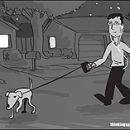Are you afraid of mice as I'm afraid of them? What about spiders and snakes? And maybe you scares darkness or height? What do you think about trips to elevator or walking along the steps? If you are thrown into a shiver at one thought about these creatures or actions - you are not crazy, you just suffer from phobia.
Content
Phobia – This is an insurmountable, obsessive fear of some kind of object or situation. As a rule, this fear is accompanied by a strong desire to avoid what you are afraid, and this in turn may interfere with the fulfillment of various actions.
Severe three types of phobias:

Specific. This is a fear of certain items or situations: closed spaces, animals (most often spiders, snakes or mice), heights, traveling by plane, water, thunderstorms, dentists, tunnels, bridges and many others.
Social. People suffering from a social phobia, fear condemnations and negative
Estimates from the outside, are afraid to look ridiculous in the eyes of other people (fear of performances in public).
Shyness and social phobia – not the same. Shy people can feel discomfort in the company of other people, but they do not worry two weeks before performing and are not trying to avoid appearing in people. At the same time, people with social phobia may not be fragrant – They can feel great when communicating with other people, with the exception of certain situations.
Agorafobia. This fear can be provoked by one episode of sudden panic. In a person suffering from agoraphobia, a panic may occur at any time without a visible reason. Despite the fact that panic lasts about a minute, the memory of these sensations is so strong that the possibility of repetition begins to scare. For this reason, people with agoraphobia avoid those places where they will not be able to get out in case of a new attack.
Causes of phobias
Studies confirm the fact that phobias – This is a complex interaction of heredity and the environment. Nevertheless, the following main reasons are distinguished:
one. A series of unpleasant episodes for a long time.
If you have repeatedly turned out in similar unpleasant situations, with time you can start afraid of negative outcome. Several negative episodes in school physical education lesson – And even after many years you may not want to get up on skis.
2. Fear.
This cause of phobia is the easiest way, since fear is imposed from the outside. For example, if your mother with screams jumped into a chair, seeing a tiny mouse, most likely, you will act as well. That is, you adopted fear of a person who was your sample of behavior. And it can be anyone with whom you are in close contact – girlfriend, neighbor and even an unfamiliar man.
3.Serious injury in the past.
If you have experienced strong emotions in the past, it can give rise to an inexplicable fear of the very situation, an object, man or a place that initially caused your fear. You can know the reason for your fear, or it can be hidden in the depths of the subconscious. In many cases, fear is suppressed.
Heal itself
If for some reason you do not want to share your problems with outsiders, try to help yourself. Understand your fear – It's just a habit. At some point in your life you learned how to react to the stimulus. Although this habit gives you a lot of trouble, you can get rid of it.
To do this, you need to understand how this happens to you. Of course, you are afraid not specifically, but you do, let them automatically. It's your brain, your body and your emotions.

one. Disassemble your fear of components.
As soon as you see an irritant, you make a number of certain actions. How does this happen? Consider on the example. You are afraid to descend from the stairs. As soon as you need to do it, you see the staircase, remember past unpleasant moments in a similar situation (you have already fallen, or girlfriend got injuries, going down in the subway, or you saw such an episode on TV), begin to cheat, imagining how leg the heel is broken, breaking down the cubem in slow motion. Pictures are accelerated – Faster and faster... Your video show and thoughts about the catastrophe make react your body – tremor, rapid pulse and t. D. And all – You are already bad.
2. Find stimuli.
Next step – understand what time you start thinking about bad. It's him – stimulus – Runs the mechanism of fear, forcing you to predicate a catastrophe. Stimulus – This is not what you feel. This kind, sound, smell or taste. If you are afraid to ride or walk along the bridge, the bridge itself can become a bridge or even thoughts about the upcoming trip across the bridge. Irritants can be somewhat.
3. Analyze the fear and its consequences.
Take four sheets of paper. On the first, write down the list of situations that can provoke your fear. On the second – Make a list of your sensations, physiological reactions that can strengthen your excitement. On the third sheet will record the worst scenario for the development of events – what will happen if you lose control over yourself.
For example, if you are afraid to fly by plane, you can write the following:
1 sheet
Thoughts about the upcoming flight
plane ticket order
Ride at the airport
2 sheet
Fresh pulse
nervousness
Shivering in the legs
3 sheet
nervousness and trembling will be noticeable surrounding
I can't stop in place
I will start screaming.
In the fourth sheet, bring the most exciting moments from the previous three in descending order (depending on your relationship - what makes the nervous more, which is less).
4. Learn to relax.
Lie on the sofa or sit in a comfortable chair, turn on meditative music, close your eyes and take turns relax all parts of your body, starting with heels. Note that you at this moment see, hear and feel. Remaining relaxed, imagine situations recorded on the fourth sheet. Start with the harmless. It will force you a little strain. Try to relax as much as possible. As soon as you learn to remain relaxed, presenting the most insignificant situation, go to the next item. But do not rush – one element of the list per day, according to psychologists, more than enough. Also, you should not go to the next item while you are nervous, thinking about the previous.
So you gradually learn how to cope with fear. Of course, such exercises are more effective under the guidance of a specialist, but if you feel the strength – Try yourself. This process requires patience and takes a few weeks or even months.
You can fight with fear in different ways. Master Suspense Alfred Hitchcock got rid of his fears, shooting films about them. Seneca senior advised: «Separate confusion from his reason, look at the very case - and you will make sure that in any of them there is nothing terrible, except for the fear». And Ezop wisely noticed: «Even the fear is soften with the habit».
Do not be afraid to fight your fear.









